
In today's fast-paced business environment, customer service plays a crucial role in maintaining and expanding a company's customer base. To provide efficient and effective customer support, many organizations choose to establish call centers. These centers rely on a combination of hardware and software to ensure smooth operations. In this blog post, we'll delve into the minimum hardware and software requirements for setting up a call center, along with a checklist of essential equipment and tools.
Allow Convin to build your call center requirement checklist!
What is Call Center Software?
Call center software is a comprehensive suite of applications and tools designed to facilitate and streamline the operations of a call center or contact center. These software solutions are specifically tailored to manage and enhance customer interactions, whether they occur through voice calls, emails, chat messages, or other communication channels.
Here, we'll explore the key components, features, and benefits of call center software in depth.
1. Key Components of Call Center Software
In the world of customer service and support, call center software serves as the backbone of efficient and effective communication. Let's delve into the key components that make up these vital software solutions, powering the operations of modern call centers.
a. Automatic Call Distributor (ACD)
The ACD component of call center software is responsible for routing incoming calls to the most appropriate agent or department based on predefined criteria, such as skill level, availability, or priority.
b. Interactive Voice Response (IVR)
IVR systems allow callers to interact with automated menus using their keypad or voice commands. These menus can provide basic information, collect caller data, and route calls without agent involvement.
c. Call Recording
This feature enables call center managers to record and store calls for quality assurance, training, and compliance purposes. It also helps resolve disputes and monitor agent performance.
d. Computer Telephony Integration (CTI)
CTI functionality allows call center software to integrate with other systems, such as customer relationship management (CRM) software. It enables agents to access customer information and history during interactions, enhancing personalization and efficiency.
e. Call Monitoring and Supervision
Supervisors can listen in on calls, whisper instructions to call center agents, or join conversations to provide immediate assistance. This feature aids in coaching and maintaining service quality.
f. Reporting and Analytics
Call center software offers extensive reporting and analytics tools to track key performance indicators (KPIs), agent productivity, and customer satisfaction. These insights help managers make data-driven decisions.
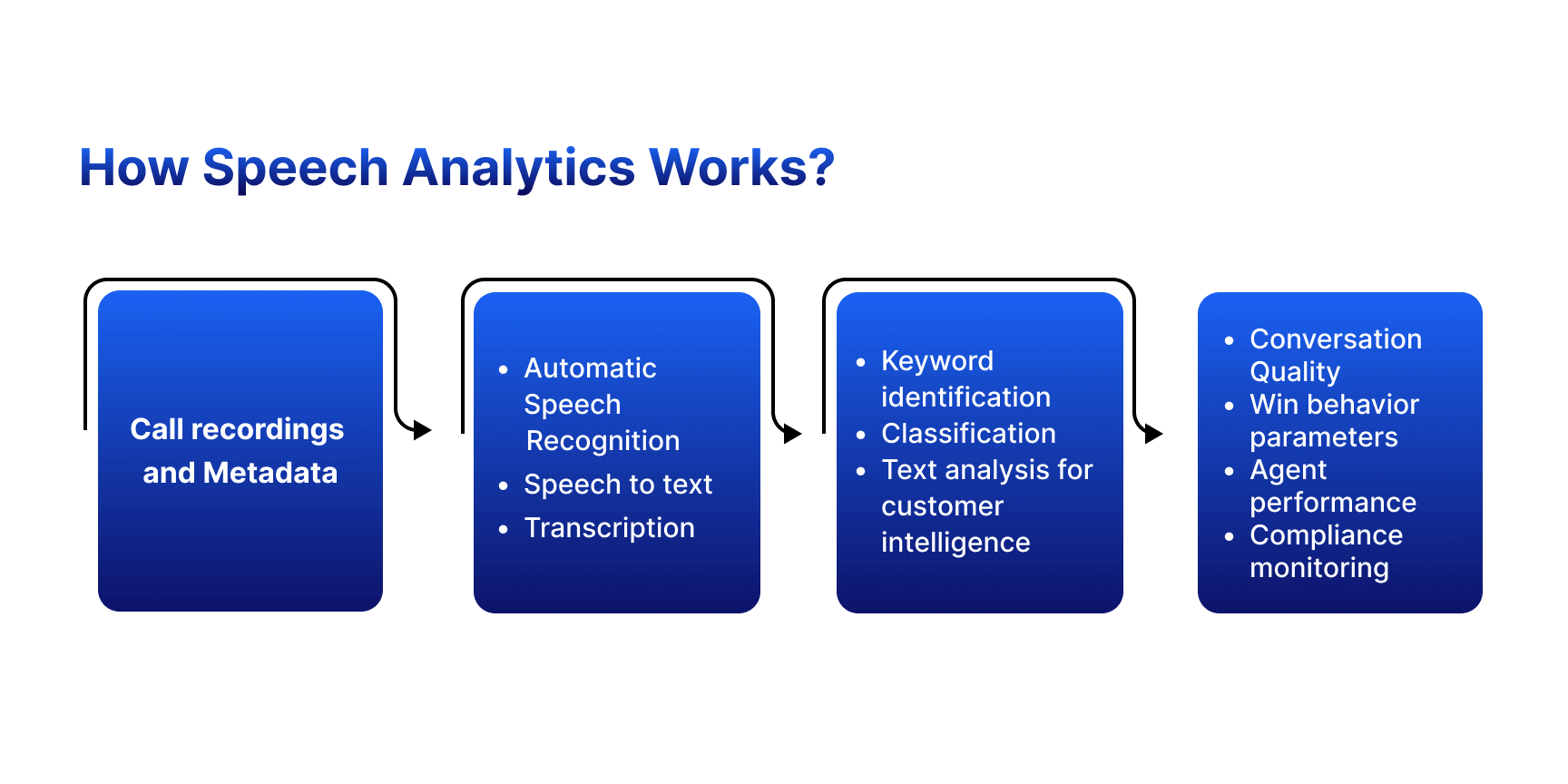
Get our FREE speech analytics evaluation checklist.
g. Omni-Channel Support
Modern call center software extends beyond voice calls to support various communication channels, including email, chat, social media, and SMS. This allows businesses to offer omnichannel customer support.
h. Skills-Based Routing
Skills-based routing ensures that incoming inquiries are directed to agents with the right expertise, leading to quicker issue resolution and improved customer satisfaction.
Now that we've explored the key components of call center software let's shift our focus to the key features and benefits that these software solutions bring to the table.
2. Key Features and Benefits of Call Center Software
In the world of customer service, the features and benefits of call center software play a pivotal role in enhancing efficiency, improving customer satisfaction, and driving business success.
a. Improved Efficiency
Call center software automates many routine tasks, such as call routing and data retrieval, reducing agent workload and enhancing efficiency.
b. Enhanced Customer Service
Personalization, quick issue resolution, and easy access to customer information contribute to a better customer experience.
c. Scalability
Call center software can be scaled up or down to accommodate changing call volumes and business needs.
d. Cost Savings
By optimizing agent resources and automating processes call center software can help reduce operational costs.
e. Data-Driven Decision-Making
The robust reporting and analytics capabilities empower managers to make informed decisions, identify trends, and implement improvements.
f. Compliance and Security
Many call center software solutions offer features to ensure compliance with industry regulations, such as PCI DSS for payment security and GDPR for data protection.
g. Remote Work Support
Modern call center software is often cloud-based, enabling call center agents to work remotely, which is especially valuable during unforeseen events like the COVID-19 pandemic.
h. Integration
Seamless integration with other software systems, such as CRM platforms, helps maintain a unified view of customer interactions.
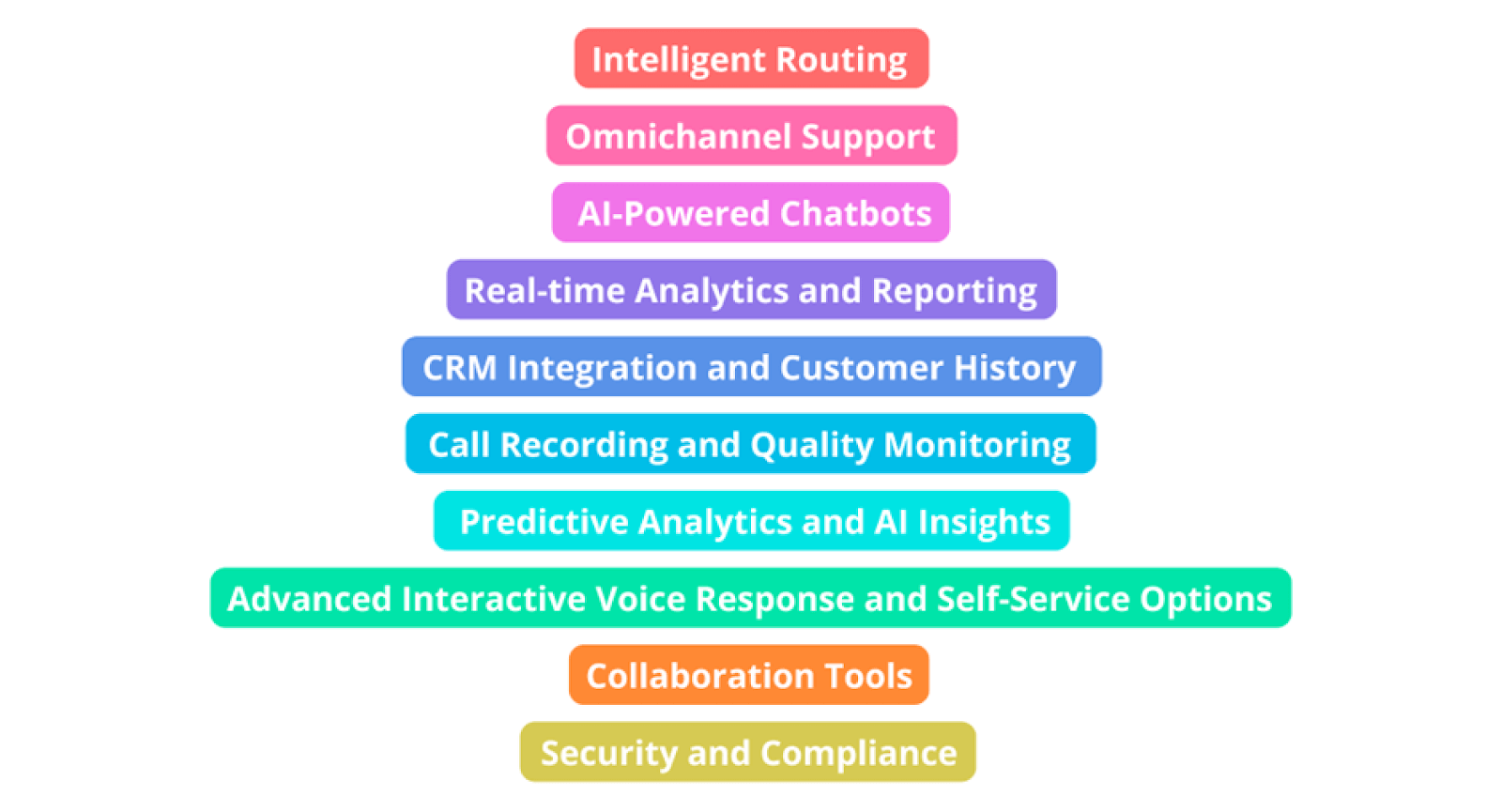
Call center software is a vital tool for organizations that prioritize exceptional customer service and efficient communication management. These software solutions are customizable to suit specific business needs and provide the technology and features required to run a successful call center operation.
Now that we've explored the key features and benefits of call center software let's shift our focus to understanding the specific requirements that call center demands for successful implementation and operation.
Explore Convin’s contact center software's key features and benefits on a live call
What are Call Center Software Requirements?
Understanding the essential requirements for call center software is paramount for businesses looking to establish efficient customer support operations. In this discussion, we'll delve into the key considerations and prerequisites that define call center software requirements, helping you make informed decisions in setting up or upgrading your call center infrastructure.
1. Call Center Software
- Definition: Call center software is a comprehensive solution that helps businesses manage customer interactions efficiently. It includes various features like call routing, IVR (Interactive Voice Response), call recording, and reporting.
- Prominent Names: Some well-known call center software providers include Genesys, Five9, Avaya, Zendesk Talk, and Twilio Flex.
2. CRM (Customer Relationship Management) Software
- Definition: CRM software helps agents access customer information, track interactions, and provide personalized service. It integrates seamlessly with call center software.
- Prominent Names: Salesforce, HubSpot, Zoho CRM, and Microsoft Dynamics 365 are popular CRM choices.
3. Predictive Dialer
- Definition: A predictive dialer automates the process of calling multiple numbers simultaneously, connecting agents with live callers, and reducing idle time.
- Prominent Names: VICIdial, 3CX, and XCALLY are some options to consider.
Now that we've explored the software requirements for call centers let's shift our focus to the equally critical aspect of call center hardware.
Results first, payment later.
What is Call Center Hardware Requirements?
Call center hardware refers to the physical equipment and devices needed to support the operations of a call center, which works in conjunction with call center software to facilitate efficient customer interactions.
In this in-depth explanation, we'll focus on the various components of call center hardware, their role in the call center ecosystem, and how they complement call center software requirements.
1. Telephony Equipment
- Definition: Telephony equipment comprises devices and systems used for voice communication. This includes IP phones, traditional landline phones, headsets, and telephony servers.
- Role: IP phones and headsets enable agents to make and receive calls, while telephony servers manage call routing and handle voice communication over the network.
- Prominent Brands: Cisco, Poly (formerly Polycom), Yealink, Grandstream, and Avaya are well-known manufacturers of IP phones and headsets.
2. Computer Hardware
- Definition: Computers are essential for call center agents to access and utilize call center software. These computers should have sufficient processing power, memory, and storage capacity to run the software efficiently.
- Role: Computers are the primary interface for agents to interact with call center software. They display customer information and call scripts, and provide access to various tools.
- Prominent Brands: Dell, HP, Lenovo, and Acer offer reliable business-grade computers suitable for call center use.
3. Network Infrastructure
- Definition: Network infrastructure encompasses the hardware and components that facilitate data transfer and connectivity within the call center. This includes routers, switches, and high-speed internet connections.
- Role: A robust network infrastructure ensures high-quality voice calls, quick data transmission, and reliable connectivity for agents using call center software.
- Prominent Brands: Cisco, Juniper Networks, Aruba (by HPE), and Ubiquiti offer networking solutions suitable for call centers.
4. Server Hardware
- Definition: For larger call centers or those with on-premises call center software installations, server hardware is necessary. These servers host the call center software and databases.
- Role: Server hardware ensures the stability and performance of the call center software, especially when dealing with a high volume of calls and data.
- Prominent Brands: Dell EMC, Hewlett Packard Enterprise (HPE), and IBM offer server solutions tailored to business needs.
5. Security Equipment
- Definition: Security equipment includes firewalls, intrusion detection systems, and encryption devices designed to protect the call center's data and communications.
- Role: These security measures safeguard sensitive customer data and prevent unauthorized access, ensuring compliance with data protection regulations.
- Prominent Brands: Fortinet, Palo Alto Networks, Check Point, and SonicWall provide security solutions suitable for call centers.
Suggested read: Complementing Compliance and Security Guide.
6. Backup and Redundancy Systems
- Definition: Backup and redundancy systems are essential for ensuring continuity of operations in case of hardware failures. These systems include uninterruptible power supplies (UPS) and backup servers.
- Role: Backup and redundancy systems prevent downtime by providing power backup and failover mechanisms in case of equipment failures.
7. Monitoring and Reporting Tools
- Definition: Specialized hardware devices and sensors may be used to monitor the call center environment, including temperature, humidity, and power consumption. These support the infrastructure's reliability.
- Role: Monitoring tools help identify issues before they cause system failures, ensuring a stable environment for call center operations.
- Prominent Brands: Convin, Deepcall, Salesforce, and Air Call.io provide monitoring and reporting solutions suitable for call centers.
Suggested read: Complimenting Reporting Software
A comprehensive call center hardware setup is crucial to support the call center software requirements, ensuring the seamless functioning of a call center. These hardware components work together to provide a reliable, efficient, and secure environment for agents to deliver exceptional customer service.
Now that we have a clear understanding of what call center hardware entails let's explore how to establish a call center with the necessary hardware and software components for efficient and effective operations.
How to Establish a Call Center with Required Hardware and Software?
Implementing a call center requires careful planning and consideration of both hardware and software requirements. To ensure a successful setup, you need to create a comprehensive call center requirement checklist that covers all essential aspects of your call center infrastructure.
1. Define Your Call Center Objectives
Before diving into the hardware and software aspects, it's crucial to define the objectives of your call center. Determine the type of customer interactions you'll handle, service level goals, and KPIs for success.
2. Assess Your Hardware Needs
Conduct a thorough assessment of your hardware requirements, including the following components
- Telephony Equipment: Decide on the type of phones (IP phones or traditional landlines) and headsets needed for agents. Consider telephony servers for call routing.
- Computer Hardware: Determine the specifications and quantity of computers needed for your agents. Ensure they meet the call center software requirements for optimal performance.
- Network Infrastructure: Plan for a robust network infrastructure with routers, switches, and high-speed internet connections to support voice and data transfer.
- Server Hardware: If your call center software requires on-premises servers, select the appropriate server hardware for hosting the software and databases.
- Security Equipment: Implement security measures like firewalls and encryption devices to protect customer data and communications.
- Backup and Redundancy Systems: Ensure you have backup systems in place, including UPS units and failover servers, to prevent downtime.
3. Choose the Right Call Center Software
Select call center software that aligns with your objectives and requirements. Consider features such as ACD, IVR, call recording, CRM integration, and reporting. Prominent call center software providers include Genesys, Five9, and Twilio Flex.
4. CRM Integration
Integrate your chosen call center software with a Customer Relationship Management (CRM) system to provide agents with access to customer information and history during interactions.
5. Skills-Based Routing and IVR Setup
Configure skills-based routing to ensure calls are directed to the most qualified agents. Set up an Interactive Voice Response (IVR) system to automate call routing and provide information to callers.
6. Agent Training
Train your agents on how to use the call center software effectively. Provide guidance on call handling, customer service best practices, and CRM usage.

7. Monitoring and Reporting Tools
Implement monitoring and reporting tools to track KPIs, agent performance, and customer satisfaction. These tools should be integrated with your call center software.
8. Compliance and Security
Ensure that your call center meets regulatory compliance requirements, such as PCI DSS for payment security and GDPR for data protection. Regularly update security measures to protect sensitive customer data.
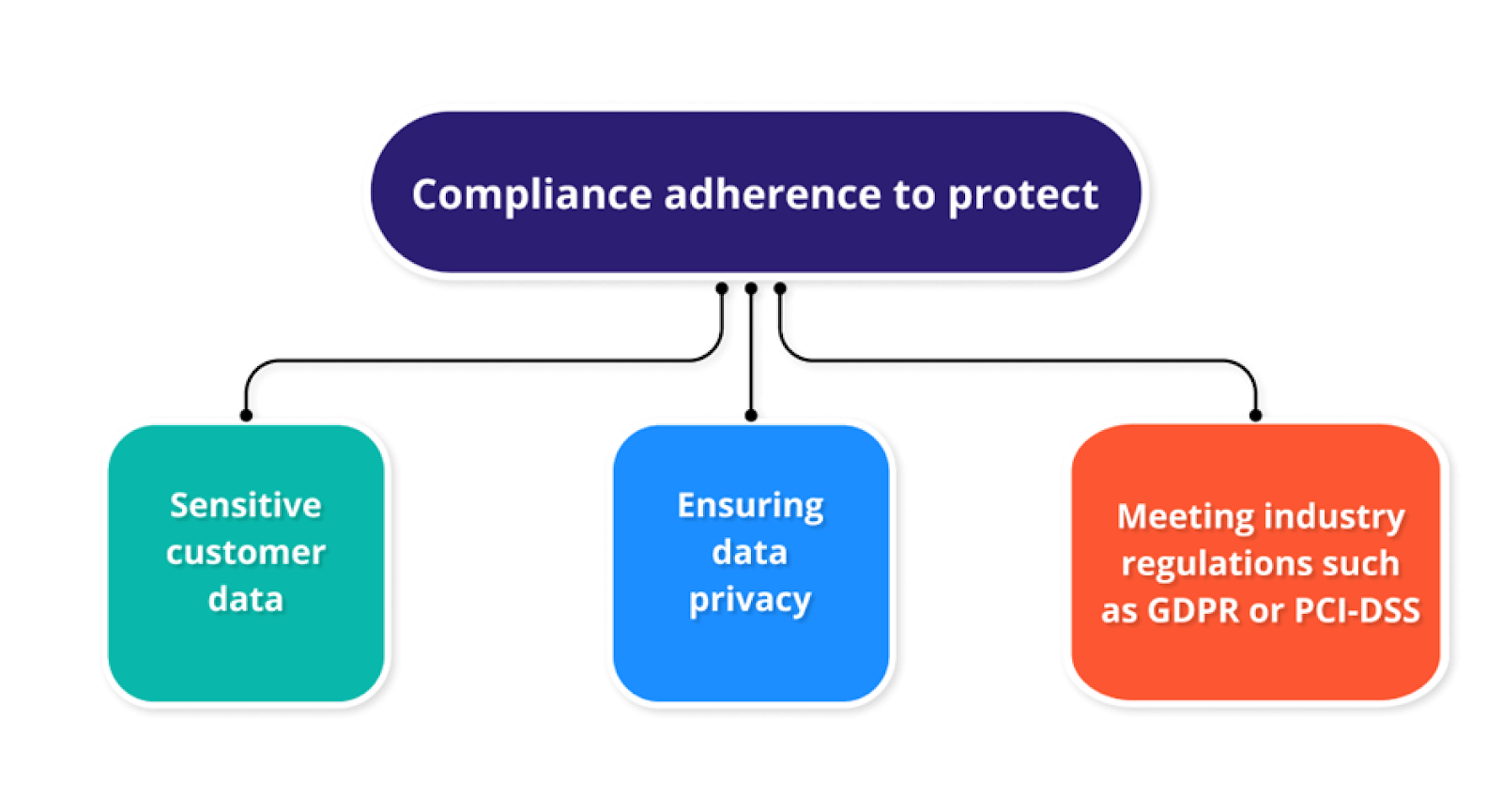
9. Scalability Planning
Plan for scalability to accommodate future growth. Choose hardware and software solutions that can easily expand to meet increasing call volumes and agent requirements.
10. Testing and Quality Assurance
Before going live, conduct thorough testing to ensure that all hardware and software components work seamlessly together. Test different call scenarios and monitor for any issues.
11. Documentation and Training Materials
Prepare comprehensive documentation and training materials for call center agents and administrators. This includes call scripts, troubleshooting guides, and user manuals.
12. Ongoing Maintenance and Optimization
Establish procedures for ongoing maintenance, updates, and optimization of your call center hardware and software. Regularly review and improve processes to enhance efficiency.
Implementing a call center is a complex process that requires careful planning, selection of appropriate hardware and software components, and a commitment to delivering excellent customer service.
By following a well-structured call center requirement checklist and staying adaptable to changing customer needs, you can create a call center that efficiently meets your business goals and exceeds customer expectations. And here is where Convin comes in. Let us take a look at it.
Count on Convin to help you succeed!
Convin is a company that specializes in AI-powered solutions for customer engagement and call center operations. They offer a range of products and services designed to help businesses establish and enhance their call centers. Here's an in-depth look at how Convin can assist in establishing a call center with its products
1. Automated Call Transcription
Convin offers automated call transcription services that can convert recorded calls into text format. This feature is invaluable for call centers, as it allows for easy documentation, analysis, and review of customer interactions.
2. Call Analytics and Insights
Convin's products provide detailed analytics and insights into call center operations. By analyzing call data, businesses can identify trends, customer sentiment, and areas for improvement. This information can inform decision-making and training initiatives.
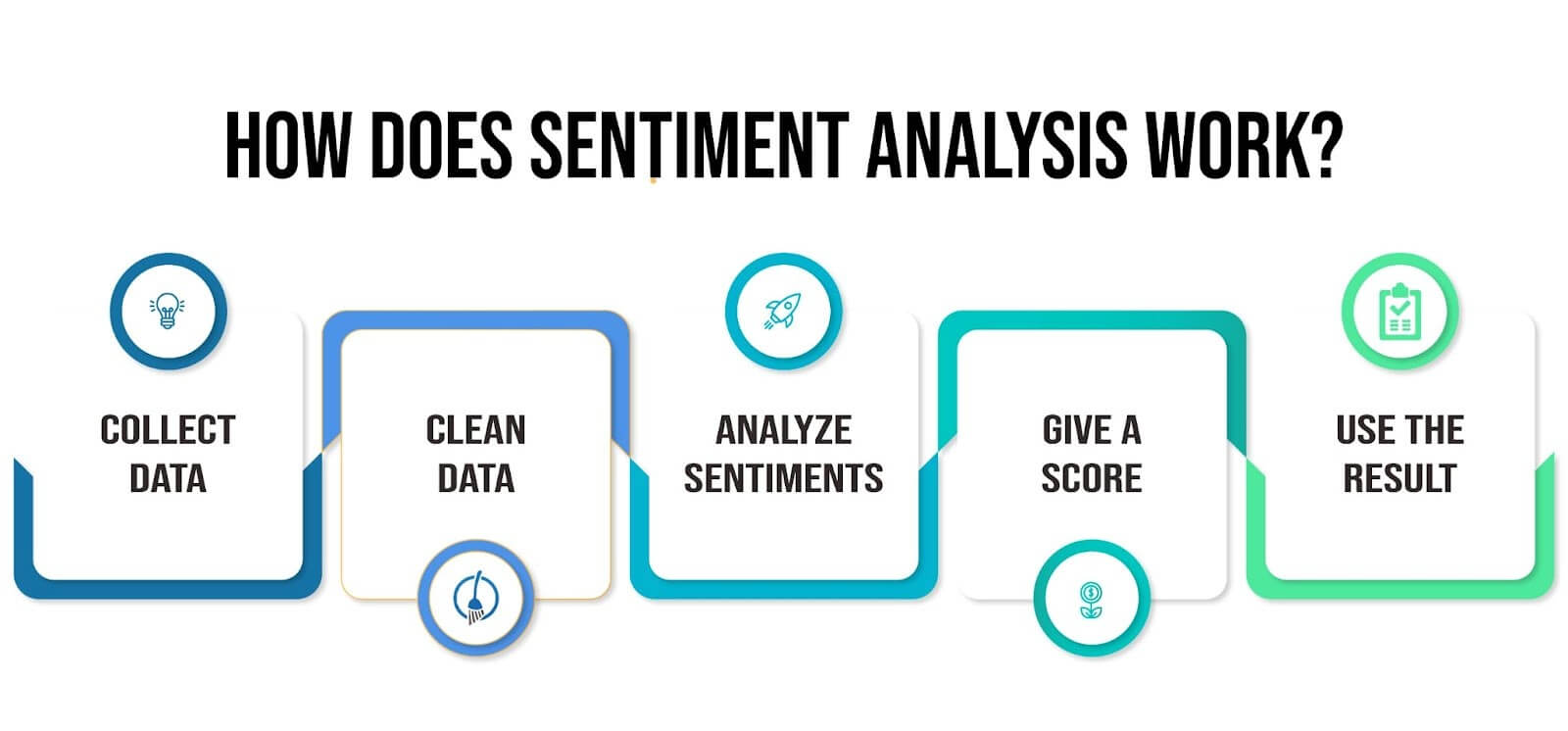
3. Quality Assurance and Compliance
Convin's AI-powered tools can assist in quality assurance by monitoring calls for compliance with regulatory standards and company policies. This helps in ensuring that agents adhere to best practices and comply with industry regulations.
4. Real-time Feedback and Coaching
The company's products can provide real-time feedback to agents during customer interactions. This instant feedback helps agents improve their communication skills, resulting in better customer service.
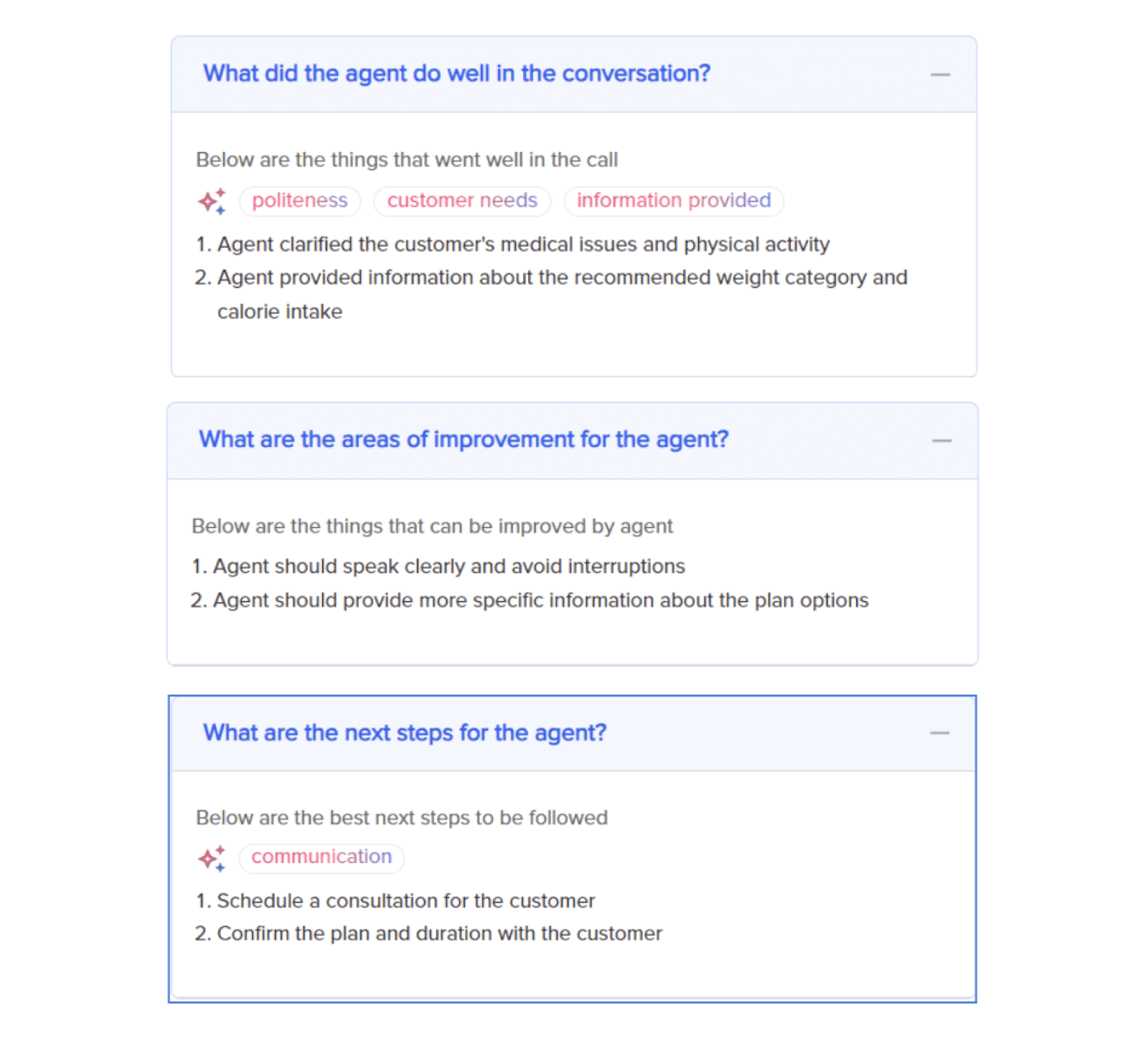
5. Integration with Existing Systems
Convin's products can integrate seamlessly with existing call center software and CRM systems. This integration ensures a smooth transition and cohesiveness in operations.
Convin's products offer a comprehensive suite of AI-driven tools and services that can significantly benefit call centers. From call transcription and analysis to real-time coaching and automation, these products help improve efficiency, customer engagement, compliance, and overall call center performance.
By leveraging Convin's solutions, businesses can establish and operate call centers that provide exceptional customer service and meet their operational goals. Are you curious? Get on a quick call to know more!
FAQ
1. What equipment is required for a call center?
Call centers require essential equipment, including computers, headsets, telephony systems, and network infrastructure.
2. What are the requirements for a call center?
Call center requirements encompass hardware, software, and personnel, ensuring efficient customer interactions and support.
3. What computer software do call centers use?
Call centers commonly use call center software, CRM systems, and telephony software for efficient call handling.
4. What are the minimum computer requirements for call center?
Minimum computer requirements for call centers typically include a stable internet connection and modern computers with adequate processing power and memory.
5. What are the minimum computer requirements?
The minimum computer requirements refer to the basic specifications needed for smooth software operation.
6. How many calls can a call center handle per day?
The number of calls a call center can handle per day varies widely based on factors like staff size, technology, and call complexity.
7. What is the hardware minimal system?
The hardware minimal system consists of the essential components needed for basic functionality, often the lowest system requirements for software operation.











































